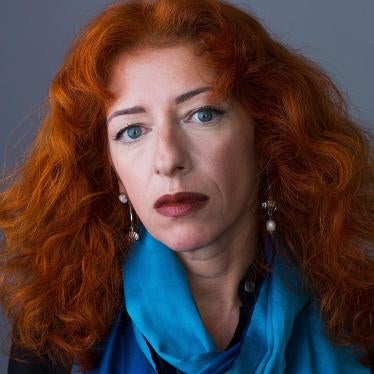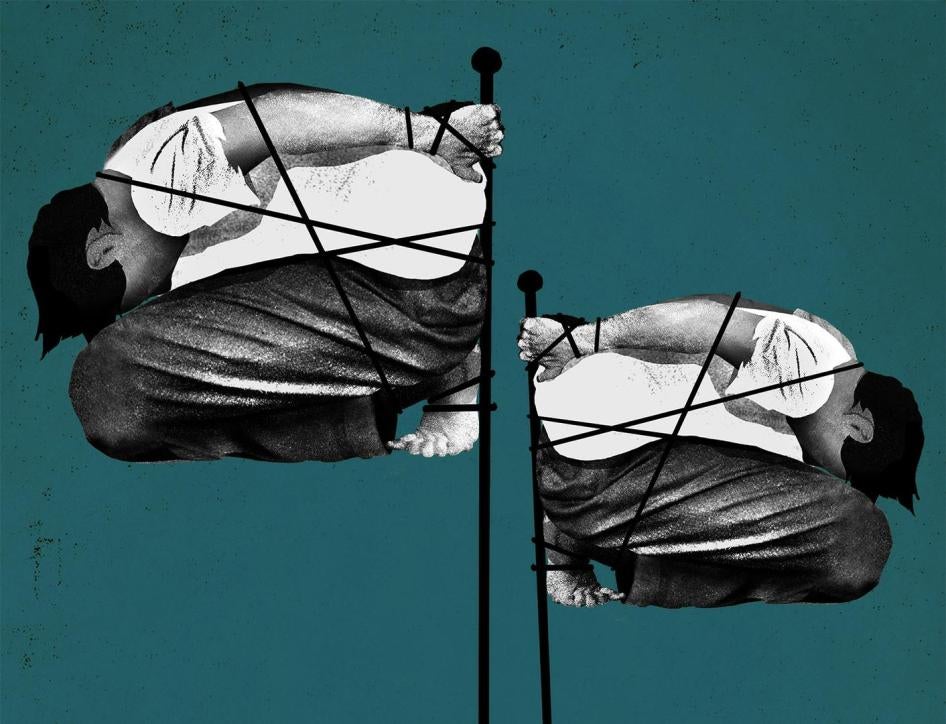Last week Amnesty International and Human Rights Watch published a joint report documenting incommunicado and secret detention of civilians by the warring sides in the conflict in eastern Ukraine. Among the places we noted where civilians had been held in secret detention was Ukraine’s Security Service (SBU) compound in Kharkiv.
Before publishing the report, we met with Ukraine’s presidential administration and military prosecutor. We shared our findings and told them we had grounds to believe that as many as 16 people may remain in secret detention at the compound. They vehemently denied the allegation but pledged to investigate.
This week, we received further information that corroborates our conclusion that at least as of June, those 16 people were still there — and indeed that another four had joined the group. The information came through a case involving not a civilian, but a man who had fought on the side of Russia-backed separatists early in the armed conflict in eastern Ukraine. But his story, which we learned from his mother, confirms the use of the SBU compound in Kharkiv for secret detention.
To the point of desperation
The man is Dmitry Korolev, 37, a former Ukrainian riot policeman from Zaporizhzhya. A few days ago his mother, Irina Koroleva, told us he left Zaporizhzhya for Donetsk in the self-proclaimed Donetsk People’s Republic (DNR) in early June 2014 to join the fighting in the east, but called it quits in late July 2014. He returned to Zaporizhzhya and resumed civilian life.
On 5 January, 2015, a group of SBU officials detained Korolev on his way home from work. SBU investigators searched his mother’s apartment the next day — presenting a search warrant, and their identification, and generally being “on good behavior,” Irina Koroleva said. Three days later, a local court approved two-months of pre-trial detention for Korolev on changes of running an “unlawful armed group.” His mother knew that prisoner exchanges were ongoing between Ukrainian authorities and the separatists. She found several prisoner exchange mediators and managed to put her son’s name on the exchange lists.
By July 2015, “everything was all set for exchange,” Irina told us. On 2 July, a court handed her son a suspended three-year sentence. The verdict was to come into force in 30 days, and the authorities transferred Korolev to a remand prison in Dnipro (formerly, Dnepropetrovsk) in the meantime. The mediators told Korolev’s mother that he’d be released on 3 August and then immediately be sent to the DNR. They said the family could have a quick meeting with him by the prison gates to say good bye and pass on some clothes and other basic necessities.
On the morning of 3 August, Irina and several other family members arrived at the Dnipro remand prison with a bag full Dmitry’s belongings. They waited by the gates, along with the exchange mediators, several hours in the stifling heat. By 2pm they couldn’t take it anymore and moved to a shady area just around the corner, losing sight of the gates. A few minutes later, two cars whooshed past them, moving at top speed from the direction of the gates. Irina swears she could hear her son scream for help from one of them, a dark mini-van with tinted windows. Irina and the others rushed to the gates. They knocked and yelled for the guards. When the guards finally came out they said they had opened the gates and let Korolev out a short time ago, and once out of the gates, he was no longer their responsibility. They said they “know nothing about two cars” and had no idea what happened to Korolev.
When Irina returned to Zaporizhzhya, she contacted the police and the prosecutor’s office. The police registered Korolev as a “missing person” and launched a search for him. Irina also contacted the SBU, where, according to her, an SBU investigator told her off the record that her son “would be exchanged when the time is right.” More than two months went by. On 14 October, Dmitry Korolev called his mother from an unknown phone number asking her to get in touch with “the other side” and urge them to put him back on exchange lists. He said he could not talk long or answer questions, but that his health was ok and he looked forward to finally being exchanged.
A week later, a young man called Irina saying he had been her son’s cellmate, and that both of them had been held in an unofficial jail on the premises of the SBU in Kharkiv, along with a bunch of other secret detainees. He said his name was Sergei, he was from Luhansk, and he had been just exchanged. He also said that Korolev was persevering but that his situation was complicated by the fact that the SBU was not keen on releasing captives with a law enforcement background.
In January this year, another man who had just been exchanged called Irina on her son’s request. He said Korolev was still held by the SBU in Kharkiv. The man also told Irina her son wanted her to know that his removal from the Dnipro remand prison had been organized by the SBU in Zaporizhzhya. In February, Kovalev called his mother personally from an unknown number. He sounded hopeful and said an exchange was in the works. He called again in April, May and June. Twice, he thought the exchange was finally happening but it turned out that that the detainees were apparently being “hidden” for a day because some “inspectors” were visiting. We know that around that time representatives of Ukraine’s ombudspersons’ office and then the UN visited the Kharkiv SBU compound.
When Korolev called in June, his mother said, he sounded desperate, saying he could no longer cope with the situation. He said that four more detainees had recently joined their group and there were twenty inmates in the facility. He also said it seemed that their captors were getting ready to move all the detainees somewhere else. This was the last time Irina heard from her son.
It is not clear whether the other detainees are civilians or were involved in the fighting. Neither it is clear whether the detainees still remain there now, more than six week’s after Korolev’s last call to his mother, or they actually got moved to another facility.
But one thing surely is crystal clear. It’s time for the Ukrainian authorities to end their blanket denials and open a robust investigation into detention — present or past, secret and incommunicado — at the Kharkiv SBU.









